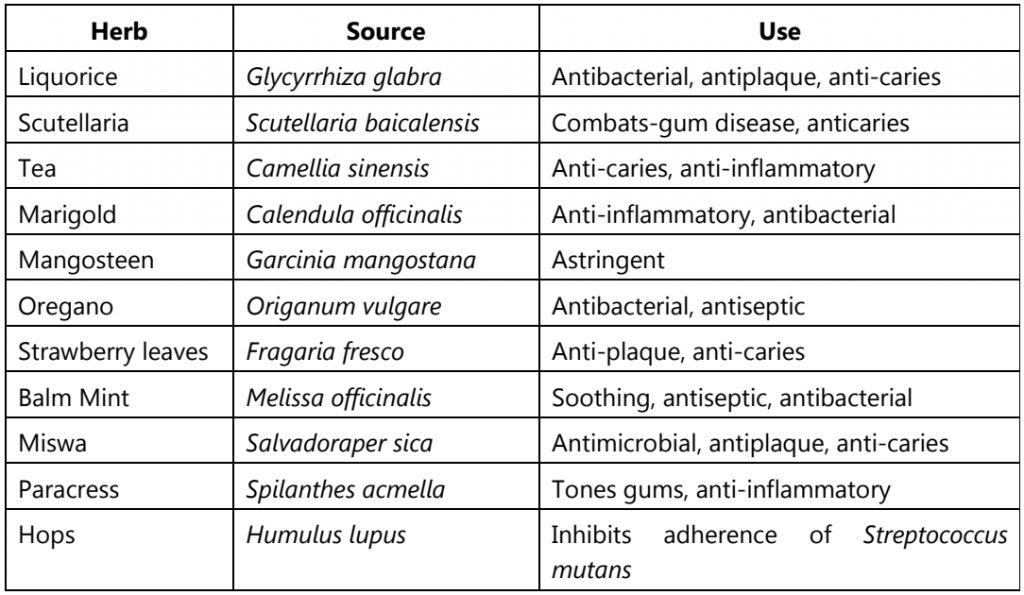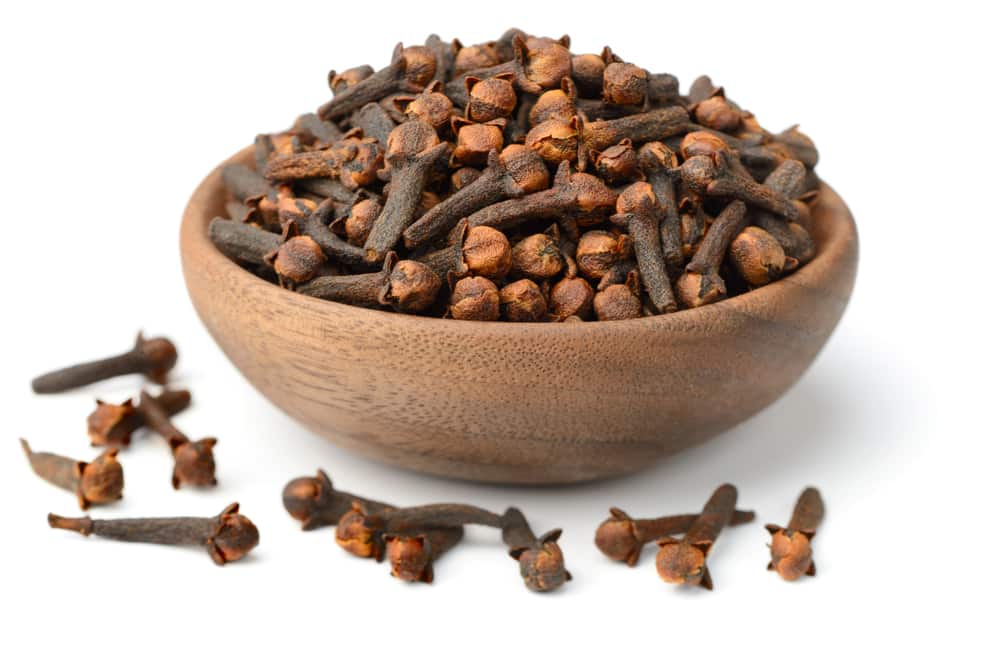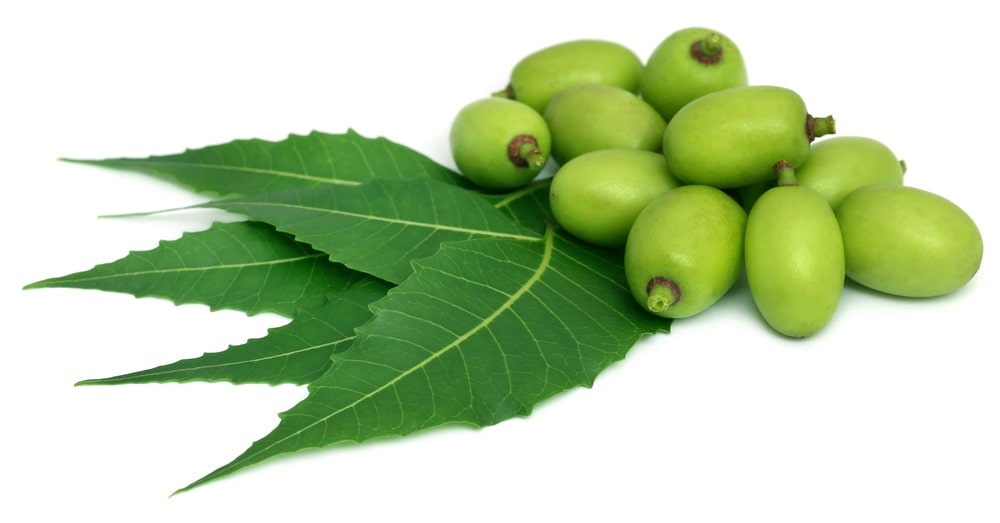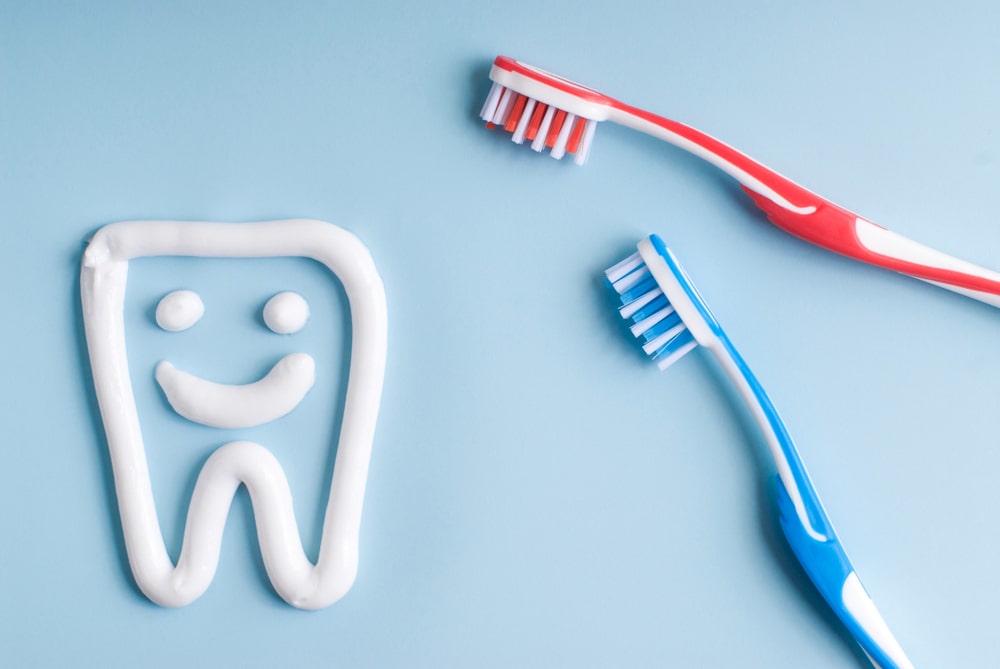Herbal Cosmetics for Oral Care: Oral health is integral to general well-being and relates to the quality of life that extends beyond the functions of the craniofacial complex. Herbs have been used for centuries to prevent and control dental disease. Herbal extracts are effective because they interact with specific chemical receptors within the body. Herbal products can vary in their potency. Therefore, care must be taken in their selection. The biggest challenge and problem is the lack of information about the effect of herbs on oral tissues, mechanism of action, and side effects. Herbs may be good alternatives to current preventive and curative treatments for oral health problems, but it is clear that we need more research. In dentistry, herbal products are used as antimicrobial agents, anti-inflammatory agents, analgesics, astringents, sedatives, and anxiolytics.
It is well documented that medicinal plants confer considerable antibacterial activity against various microorganisms including bacteria responsible for dental caries. Phytochemicals for the prevention, treatment, and maintenance of periodontal diseases have been identified. They may be tannins, terpenoids, flavonoids, and alkaloids. Antimicrobial activities of these are particularly useful for periodontal diseases. Aloe vera, Bloodroot, Caraway, Chamomile, Clove, Cranberry, Evening Primrose, Garlic, Ginger, Green Tea, Haritaki, Liquorice, Myrrh, Neem, Peppermint, Propolis, Purple Coneflower, Rosemary, Sage, Thyme, Turmeric, Tulsi and Triphala are useful in dentistry. The table represents a list of drugs used in oral care.
Table.1: Drugs used in oral care

Clove
Clove or E. caryophyllata is an evergreen tree, which produces a flower bud that has numerous medicinal properties. It is often referred to as clove bud and has been extensively used in the ancient Indian and Chinese civilizations and it spread to other parts of the world, including Europe, during the seventh and eighth centuries. Clove oil is traditionally used as a savoring agent and antimicrobial agent in food. It has a wide variety of biological activities including antimicrobial, antifungal, and antioxidant. The role of clove oil in dentistry includes:
- Treating dry socket
- As temporary restorative material
- As a local anesthetic agent
- For tooth pain
- Against Candidiasis
The essential oil comprises a total of 23 identified constituents, among them eugenol, followed by β-caryophyllene, α-humulene, and eugenol acetate are the main components. The most prominent use of clove oil is in dental care. The germicidal properties of the oil make it very effective for relieving dental pain, toothache, sore gums, and mouth ulcers. Clove oil contains the compound eugenol, which has been used in dentistry for numerous years. Gargles with diluted clove oil help in easing the throat. The characteristic smell of clove oil helps remove bad breath. As a result, clove oil is added to numerous dental products and medications, including, mouthwashes, and toothpaste. Dentists also mix clove oil with zinc oxide and prepare a white filling material as a temporary alternative to a root canal.

Clove toothpaste has a soothing formula for sensitivity with clove. It reaches deep inside sensitive areas of teeth to provide lasting relief and prevents sensitivity from coming back. Clove with salt, neem, or charcoal toothpaste is available in the Indian market. The popularity of these toothpaste is increasing day by day because of free from toxic chemicals, especially fluorides. The combination of clove, cinnamon, and peppermint in mouth wash gives the mouth a nice zing, and can use it as often as because it doesn’t contain any harsh ingredients.
Neem (Azadirachata indica)
“Neem’s role as a wonder drug is stressed as far back as 4500 years ago and has numerous health restoring benefits. In past years extensive research on therapeutic benefits of neem in oral and dental problems has proved its efficacy as an excellent and inexpensive antimicrobial, anti-inflammatory and anti-cancer agent. Therapeutic effects of neem in oral diseases include:
Antibacterial action: Azadirachtin and Nimbin are principal antibacterial constituents of neem. Neem leaf extract causes a significant reduction in plaque index and bacterial count especially of S. mutans and Lactobacilli species.
Antifungal properties: Neem oil and leaves have antifungal properties and have been effective in the reduction of Candida-induced denture stomatitis. Neem oil/extract is effective against various fungi (Aspergillus flavus, A. niger, A. fumigatus, A. terreus, C. Albicans, and M. gypseum) in vitro.
Anticariogenic effect: Neem bark and twigs have been used as natural toothbrushes for ages. Neem bark extract has significant anti-cariogenic properties on various cariogenic bacteria inhabiting oral flora.
Anti-inflammatory: Neem extract is effective in reducing acute and chronic inflammation.
Antioxidant properties: Neem extract prevents oxidative and hydroxyl ion-induced mucosal damage thereby exerting an antiulcer effect.
Since the early days, people in India use neem toothbrushes instead of neem toothpaste. Chewing of neem toothbrushes has for many centuries been the commonly preferred way to prevent gum disease and maintain healthy teeth. This chewing property of neem toothbrushes for dental care has helped Indian villagers to avoid cavities and tooth loss although they have no access to modern dental care facilities or products. This chewing advantage of neem toothbrush has been picked up by many cosmeceutical manufacturers and neem toothpaste for oral care has been introduced in the Indian market. Neem toothpaste mainly contains neem leaf powder. Interestingly the neem leaf is not even the most effective neem product for dental care purposes, but manufacturers would not want to use bark in toothpaste because that would make it brown. Such a product would not have cosmetic appeal. Some toothpaste does contain bark extracts. Neem mouth wash often uses neem bark extract as well as a leaf extract.

Neem tooth powder can contain not only dried leaf but also neem bark and neem seed. Neem tooth powder (a mixture of powder of neem seeds, rock salt, and alum) is also available in the market for maintaining healthy teeth and gums. Recently neem mouth gel made from dried neem leaves (contains 25% alcoholic neem leaves extract) and neem gargles are also under investigation for oral care.
Make sure you also check our other amazing Article on : Herbal Cosmetics for Hair Care
